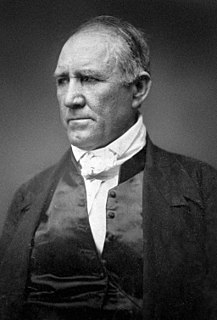A Quote by Sucheta Dalal
Indias rapid economic growth has mainly been due to the dismantling of government controls. An attempt to reintroduce monopolistic pricing must be strongly opposed.
Related Quotes
The slave states of Western world are an outgrowth of monopolistic capitalism - an economic system which is opposed to the wide distribution of private property in many hands. Instead, monopolistic capitalism concentrates productive wealth among a few men, allowing the rest to become a vast proletariat.
I have ever been opposed to banks, - opposed to internal improvements by the general government, - opposed to distribution of public lands among the states, - opposed to taking the power from the hands of the people, - opposed to special monopolies, - opposed to a protective tariff, - opposed to a latitudinal construction of the constitution, - opposed to slavery agitation and disunion. This is my democracy. Point to a single act of my public career not in keeping with these principles.
It cannot be too strongly asserted that the insistence on blind, unreasoning faith is due mainly to the maintenance of a subject-matter upon which there was no knowledge, namely the 'other world'; and that this basis was assumed because of early man's preoccupation with death. It is, unfortunately, quite possible to believe a thing which is contradicted by facts, especially if the facts are not generally known; but if the whole position on which we rested our religions had been visibly opposed by what we did know, even the unthinking masses would, in time, have noticed it.
A combination of very rapid population growth over the last 50 years and reckless economic growth during the same time has stored up massive problems for societies the world over. No nation is immune. The scientific evidence tells us all we need to know: carry on with business-as-usual growth-at-all-costs, and we're stuffed
Economic growth must be the central issue because it is only through growth that the devastating threat of national bankruptcy can be averted. Furthermore, it is only by reviving American economic growth that the West's global predominance can be sustained, and peace and freedom kept secure around the world.
The triumph of science has been mainly due to its practical utility, and there has been an attempt to divorce this aspect from that of theory, thus making science more and more a technique, and less and less a doctrine as to the nature of the world. The penetration of this point of view to philosophers is very recent.

































